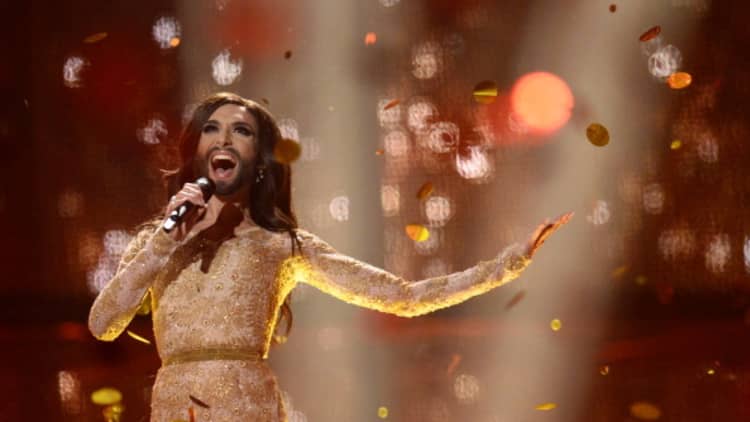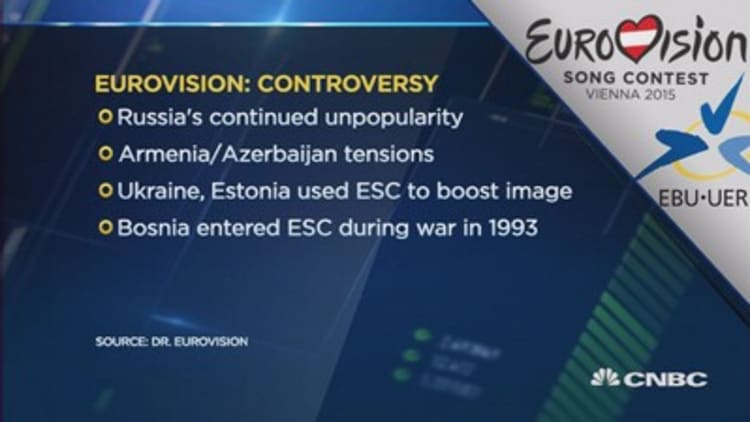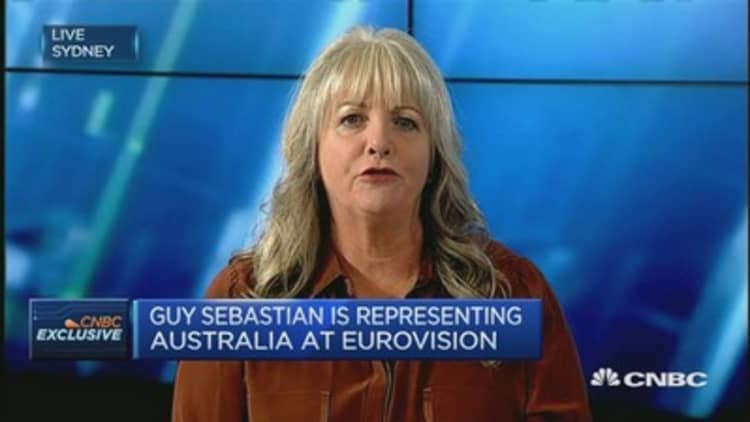
2015 marks the sixtieth anniversary of the infamous Eurovision Song Contest, in which Australia will be making a debut guest appearance.
The annual contest, in which participating European countries perform a song on live television and then cast votes for each other's songs to determine the most popular, is supposed to be about light entertainment and talent, but is repeatedly dubbed "political."
While musicality is important, expert and media commentator on Eurovision, Paul Jordan, told CNBC that "politics does come into it"—whether the event's organizers admit it or not.
This year, all eyes are on Russia, with many viewing its entry—a song themed about love and unity—as a tactic to improve the country's image.
Indeed, Russia is considered a favorite to win on Saturday, but it could also lose out on votes due to tensions with other countries and its hard-line stance on homosexuality—particularly given that the contest's popularity with the gay community and its trumpeting of diversity.
Last year, the contest was won by bearded cross-dresser, Conchita Wurst from Austria, and this year's host city, Vienna, has installed gay-themed traffic lights to emphasize its commitment to tolerance and diversity.
"It's an incredibly interesting event to watch; certainly in terms of how countries present themselves and see themselves in that world order," said Jordan.

Russia to win?
If Russia wins, "it will be hugely interesting" said Jordan, considering the friction with Western Europe, the crisis in Ukraine and the fact that Eurovision attracts many gay viewers.
Indeed, many were skeptical about Russia even entering this year, after the country's 2014 entry, the Tolmachevy Sisters, were booed by audience members.
On the upside for Russia, countries that were formerly members of the Soviet Union often allocate high scores to Russia—and vice-versa. In addition, Ukraine is not participating this year, due to financial constraints.
So should your money be on Russia? Maybe not—Jordan told CNBC that as a one-off entry Australia was a "great bet." It has already benefited from plenty of limelight and a victory could see the quintessentially European contest get Australia co-hosting the event next year.

Friendly 'bloc voting'
A 2014 study by University College London highlighted that countries participating in the Eurovision tended to vote in four key clusters, comprising of the countries of former Yugoslavia alongside Switzerland and Austria, central and southern Europe, and a bigger group including the former Soviet bloc, Scandinavian countries, the U.K. and Ireland, which tends to split into two each year.
"Neighborly" voting is common too, with countries giving high points to their next-door-neighbor and vice-versa.
Complaints about bias and discrimination abound—indeed, veteran broadcaster, Terry Wogan, quit as a U.K. commentator for Eurovision after 35 years, complaining that the contest was no longer about music.
The "Big Five" comprising of the U.K., France, Germany, Spain and Italy come in for particular criticism, because their financial contributions to the European Broadcasting Union mean they automatically qualify for the Eurovision Grand Final—irrespective of the quality of their acts' performance.
Lyrical battleground
Another country to watch this year is Greece. Greece's song lyrics have been interpreted as geopolitical critique, with "take me out of this firing hell" and "I feel betrayed" linked to the country's ongoing debt crisis.
Paul Jordan believes that Eurovision gives countries an opportunity to assert themselves and "pass judgment on other countries, without the fear of repercussion"—at least in theory.
Georgia withdrew from the Eurovision's 2009 contest, held in Moscow, after entering a song called "We Don't Wanna Put in" that was taken as criticism of Russian prime minister, Vladimir Putin. This followed the outbreak of war between the two countries in 2008.
Furthermore, a number of Azerbaijanis were interrogated in 2009 by the Azerbaijan Ministry of National Security, after voting for Armenia. The two nations have been locked in a "frozen conflict" since a war during the 1980s and 1990s and Armenia declined to participate in the Eurovision in 2012, when the event was hosted by Azerbaijan.
When to watch
Is your interest piqued? The Big Five countries plus Austria will hold press conferences on Friday, to be followed by the Eurovision Grand Final on Saturday evening.


